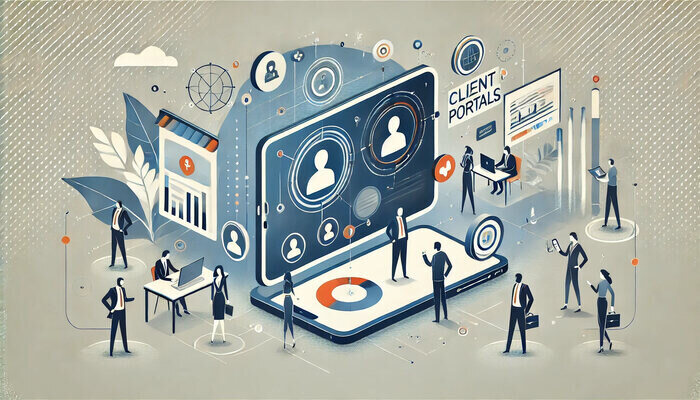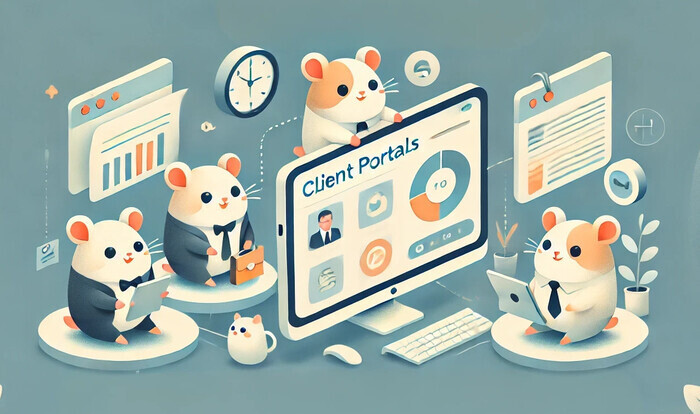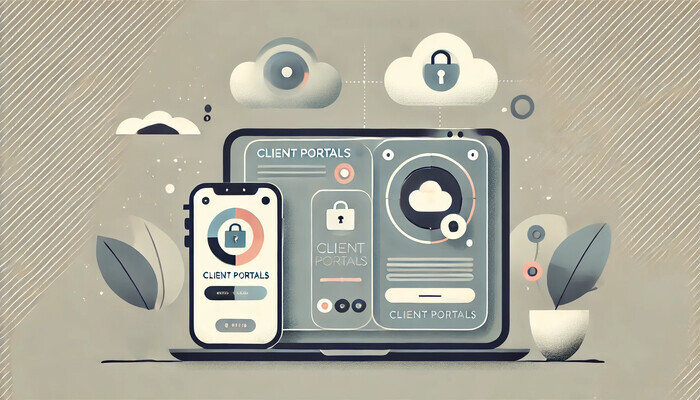
Businesses are constantly striving to enhance the client experience and stay ahead of the competition. Perhaps one of the best ways to do this is by offering them a client portal – an online access point where customers can obtain information, support, and services 24/7.
A strong example is a financial advisory firm that provides clients with access to view their investment portfolios, retrieve essential financial documents, and communicate directly with their advisors through the portal. This approach not only improves the client experience but also reduces the administrative workload for the firm’s staff, allowing them to focus on high-value activities.
In this article, we explore the benefits of client portals, their importance in modern business, and the key features to consider when choosing the right portal for an organization.
What Is a Client Portal?
According to Global Market Insights’ forecast for the client portal software market, «the Client Portal Software Market size was valued at USD 1.7 billion in 2023 and is estimated to register a CAGR of over 8% between 2024 and 2032, due to the growing demand for enhanced customer experience.» As highlighted on the source website, businesses are increasingly focused on delivering «seamless and personalized interactions with their clients.»
A client portal is essentially a web-based platform that allows clients to access their personal information, communicate with your business, and access other services from a secure, centralized location. This integrated space facilitates client interactions with a business, reducing administrative burdens and increasing client satisfaction. To clarify this concept, here are a few examples:
- Health Care. A medical center might implement a client portal where patients can log in to access their medical records, schedule appointments, and communicate with healthcare providers. This eliminates the need for phone calls and paperwork, streamlining patient management and minimizing patient effort.
- Financial Services. A financial management company might adopt a client portal to provide clients with an easy view of their investment portfolios, access to financial documents, and consistent online communication with their advisors. This creates transparency and gives clients greater control over their finances.
- E-commerce. An e-retailer can establish a customer portal where customers can check order status, access product details, and communicate with customer support representatives. This enhances the shopping experience and reduces the likelihood of misunderstandings or miscommunication.
- Professional Services. A law firm could deploy a client portal that allows clients to access case files, communicate with attorneys, and track case status. This fosters transparency and efficiency, helping clients feel well-informed and supported.
In each of these examples, the client portal acts as a secure, centralized point of interaction that minimizes administrative tasks and enhances the customer experience. By providing clients with 24/7 access to information, support, and services, businesses can foster trust, loyalty, and long-term relationships.
Benefits of Client Portals to Businesses
According to Accomplish’s research, «portals are an important differentiator for both client experience (CX) and firms’ operational efficiency, making them a key feature of digital CX strategies.» Specifically, «enabling clients to view, read and download existing data and reports either replicates or improves their existing experience.»
In fact, the advantages accruing from a client portal are numerous. These could be summarized under three broad headings listed as follows:
Improved Customer Experience
Customer portals bring numerous advantages, with significant impacts in three central areas.
First, a client portal enhances the customer experience (CX). By offering 24/7 access to information and customer support, businesses empower customers to manage their interactions more independently. For example, a software company can provide customers with access to product documentation, tutorials, and support tickets through a client portal, allowing them to find answers to their questions anytime.
Additionally, client portals can offer personalized dashboards with notifications, enabling each customer to enjoy a tailored experience. A financial institution, for instance, might use a client portal to give customers a customized view of their account activities, supplemented with personalized notifications and alerts.
Also, client portals help reduce the administrative workload for businesses by streamlining communication and providing clients with self-service options. For example, a healthcare provider can allow patients to schedule appointments and access medical records independently, freeing up staff to focus on higher-value tasks.
Simplified Communication
Another significant benefit of client portals is the simplification of communication. By acting as a centralized platform for the exchange of documents, requests, and updates, a client portal can help reduce email clutter and prevent miscommunication. For example, a law firm might implement a client portal where case files and updates are shared directly, avoiding lengthy email chains. Additionally, real-time updates and notifications keep clients informed and help minimize misunderstandings.
Enhanced Efficiency
Finally, one of the greatest advantages of client portals is their potential to drive significant efficiency for businesses. By automating processes and reducing administrative tasks, client portals free up human resources for high-value work.
For example, a healthcare provider can automate the sharing of medical records and test results through a client portal, reducing the volume of calls and inquiries and allowing staff to focus on providing quality care. Integrating a client portal with existing systems, such as CRM and project management software, minimizes data duplication and helps prevent errors. For instance, a consulting firm might develop a client portal that allows clients to view project updates and documents, then integrate it with the firm’s project management tool to ensure data remains up-to-date and accurate.
In the end, the benefits that client portals bring to a business range from enhancing the customer experience to streamlining communication and boosting efficiency. A client portal enables a company to provide clients with a more personalized and seamless experience while minimizing administrative overhead and improving overall performance.

Why Client Portals Are Much Needed for Any Business Today
According to 2024 statistics on client portals from LLCBuddy (a US-based startup assistant platform), «33% of clients worldwide who ended a business connection last year did so due to a lack of personalisation.» Isn’t it a good reason to implement a client portal? Besides, 88% of clients would be more inclined to stay with a business if it provided a welcoming and product-educational onboarding material.
While the most straightforward and compelling reason to start a client portal is this one: 89% of clients want the opportunity to give feedback.
If you are still hesitating, here are some more reasons:
Growing Demand by Customers for Digital Self-Service
One of the primary reasons client portals are becoming essential in modern business is the growing demand for digital self-service from customers. Customers expect ease, convenience, and quick access to information and services online—and they are likely to switch to competitors who provide this experience.
A client portal caters to this demand, helping businesses stay ahead of the competition. For instance, a bank can offer a client portal that allows customers to check their account status, pay bills, and transfer money online in a user-friendly way, with the option for personalized interactions when needed.
Competitive Advantage in Key Sectors
The second key reason client portals are essential is that they can be a crucial differentiator in highly competitive sectors. Industries like finance, healthcare, and law are intensely competitive, where just one or two factors can truly set a business apart.
A client portal can provide this edge by demonstrating a firm’s commitment to customer satisfaction and convenience, helping it lead within its industry. For example, a client portal allows a law firm to securely offer clients access to their case files and updates, setting the firm apart from competitors and building its reputation for innovative, client-focused service.
Security and Compliance
Lastly, the most critical reason client portals are considered essential is that they must be designed to handle sensitive customer data with state-of-the-art security features, including access controls, encryption, and strict compliance with applicable laws and regulations.
Data security is one of the primary concerns for customers in today’s digital world, and businesses should take every possible precaution to protect sensitive information. A client portal with robust security features ensures data protection and compliance, helping to build trust with customers. For example, healthcare providers can share medical records and test results with patients through a secure, encrypted client portal.
In summary, modern client portals meet the increasing customer demand for digital self-service, provide a competitive advantage in key industries, and ensure the secure handling of sensitive customer data. With a well-designed client portal, your business can stay ahead of the competition, strengthen its industry standing, and demonstrate a strong commitment to customer satisfaction and data security.
Key Features of a Successful Client Portal
When considering a client portal, it is important to ensure that it can meet your business needs and those of your customers. Below are some of the key features that are highly desirable:
Easy-to-Use Interface and Options for Customization
A successful client portal should be easy for users to navigate, even those who are less familiar with technology. This can be achieved through a clean and intuitive design, clear instructions, and minimal clutter.
Additionally, personalization options are crucial for ensuring a seamless experience for users, as businesses can customize the portal to align with their specific needs and branding. For example, a business can personalize the layout, colors, and logo of the portal to match its website and marketing materials.
Third-Party System Integration
Another important feature of an effective client portal is its ability to integrate with existing systems, such as CRM and project management tools. Integration helps reduce data duplication and associated errors, while ensuring that customer information is always accurate and up-to-date.
By integrating the client portal with existing systems, businesses can also streamline their workflows and improve efficiency. For instance, a company can integrate its CRM system with the portal, ensuring customer information is automatically updated and communication records are synchronized..
Access Control, Encrypted Data Storage, and Smooth Communication Tools
A successful client portal must secure sensitive information using robust access control, encrypted data storage, and seamless communication tools. Secure access control prevents unauthorized users from accessing the portal, while encrypted data storage protects sensitive information from cyber threats.
Additionally, communication tools such as messaging and file-sharing options can enhance both security and efficiency in the transmission of customer data. Two-factor authentication, encryption of all stored data, and secure file-sharing features are key to safeguarding customer information.
In summary, an effective client portal should offer an intuitive interface and personalization options, integrate smoothly with current systems, and ensure the secure processing of sensitive data. By considering these key features, you can ensure that your client portal meets the needs of both customers and the business itself.
How to Choose the Right Client Portal for Your Business
Before choosing a client portal, several important factors must be considered to ensure that the portal meets both your needs and those of your customers. Here are some essential aspects to evaluate when selecting a client portal:
- Scalability. Among all the factors, scalability is one of the most important when choosing a client portal. It should be able to grow with your business, handling increased traffic and data as your business expands. A scalable portal ensures that, even as your business evolves, it can continue providing enhanced services to your customers. For instance, if rapid growth is expected, you should select a portal capable of supporting a large number of users and a high volume of data. The portal should be easily scalable both up and down.
- Security. Security is another crucial consideration. The portal must include top-tier security features to protect sensitive customer information, such as encryption, secure access protocols, and regular security updates. These measures will help safeguard customer data from cyber threats and ensure your business complies with relevant regulations. For example, a business dealing with sensitive financial information may prioritize a portal with advanced security features like two-factor authentication and data encryption..
- Customization is another important factor to consider when selecting a client portal. The portal should be flexible enough to be tailored to suit your specific needs, including customized branding, layout, and features. This helps ensure a smooth user experience and ensures that the portal aligns with your business’s overall brand and strategy. For example, a company with a strong brand identity may want a portal that can be fully customized, from the colors and logo to the layout and functionality.
- Mobile Access. Lastly, mobile access is an important consideration. The client portal should provide easy access to information and services through a mobile-friendly interface with a responsive design. This ensures that customers can access the portal anytime, anywhere, using their mobile devices. For example, a business operating in an industry with a large number of mobile phone users may want to choose a portal that offers either a mobile app or one optimized for use on smartphones and other mobile devices.
Scalability, security, customization, and mobile access are all critical factors to consider when selecting a client portal. Keeping these key considerations in mind will help ensure that the chosen portal meets your customers’ needs and supports the overall success of your business.

Conclusion
In the end, the client portal streamlines workflows and revitalizes the customer experience (CX) by increasing efficiency. By understanding the benefits of a client portal, recognizing what makes a great portal, and considering the key aspects of the model, you can be confident that you’ll choose the right client portal for your company, giving it a competitive edge in today’s digital landscape.
Good luck with your technical writing!
Author, host, and deliver documentation across platforms and devices.



